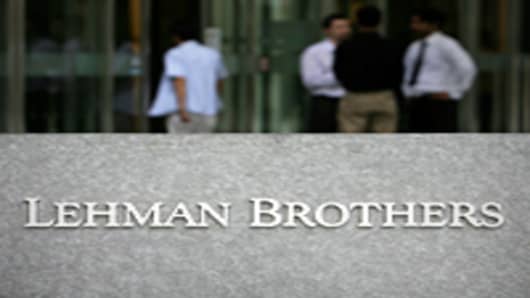The men in patterned shirts clutched bottles of beer while leaning in to talk to each other over the sounds of the Irish band. Women sipped glasses of wine or vodka tonics, some silently debating whether to take off the heels that were far past beginning to pinch their feet and change into flip flops hidden in oversized handbags.
It was, in short, a scene like many others being played out across Manhattan. Young professionals having drinks after work.
But there was a difference. No one asked the otherwise ubiquitious question: “Where do you work?” Instead, they asked: “What did you do at Lehman?”
Last night, scores of former Lehman Brothersemployees gathered at Emmett O’Lunney’s bar on 50th street near Broadway to commemorate the day Lehman died. Two years ago, the investment bank formerly known as Lehman declared bankruptcy after learning that neither the government nor a larger financial institution would rescue it from the severe financial distress it faced.
O’Lunney’s was long a Lehman Brothers bar. Although we never saw Dick Fuld there—he favored Bobby Van’s, according to legend—we met everyone from equities traders to structured products salesmen to secretaries to security guards in O’Lunney’s. Many regarded Emmett O’Lunney, the owner of the bar, as a personal friend.
The week Lehman died O’Lunney’s was a bittersweet place to visit. Many who had ducked in from Lehman Brothers were clearly shaken. Some thought they may be having their final drink together. Nearly all believed they’d be searching for a new job the following week. Many people were clearly deeper into the drink than they’d ordinarily get on a Sunday or Monday night.
Last night, however, the mood was decidedly more upbeat. The chatter was lively and the drinking lighter. There was laughter, flirtation, and even a bit of bragging about who kept their job when Barclay’s Capital took over or who found a new, better job after they were let go.
“No one here looks unemployed,” one of the former Lehmanites said.
That was true. From the clothes they wore to their confident gazes, almost everyone at the bar had the look of the employed.
“You have to wonder if the unemployment rate of for Lehman Brothers people is somewhat lower than the unemployment rate of ordinary Americans,” a woman dressed in a tan dress said to a reporter who had infiltrated the Lehman commemoration.
She bid the reporter farewell. It was getting late enough in the evening that it was threatening to become early in the morning. And, after all, she had a job to get to in the morning. A job sitting at the very same desk she had walked away from two years ago, convinced she’d never be back again.
Questions? Comments? Email us atNetNet@cnbc.com
Follow John on Twitter @ twitter.com/Carney
Follow NetNet on Twitter @ twitter.com/CNBCnetnet
Facebook us @ www.facebook.com/NetNetCNBC



